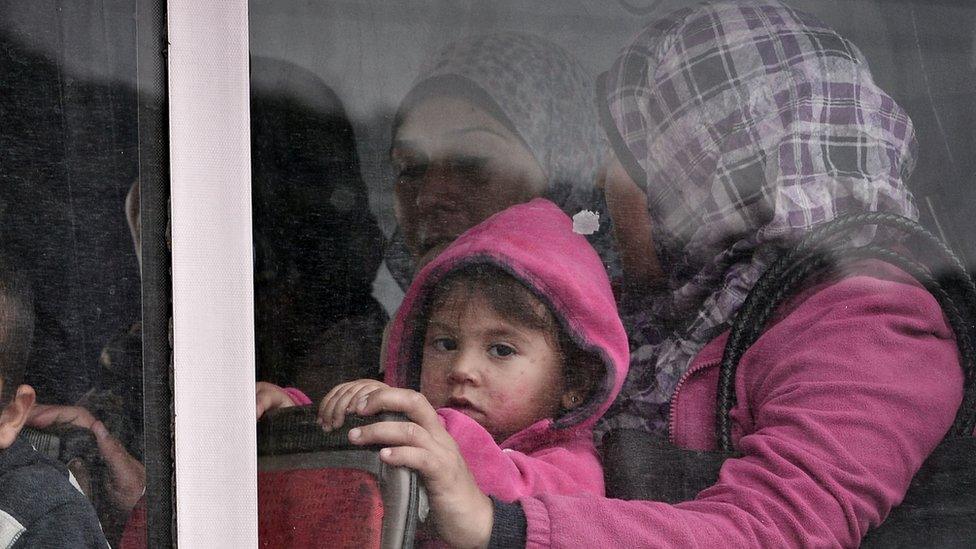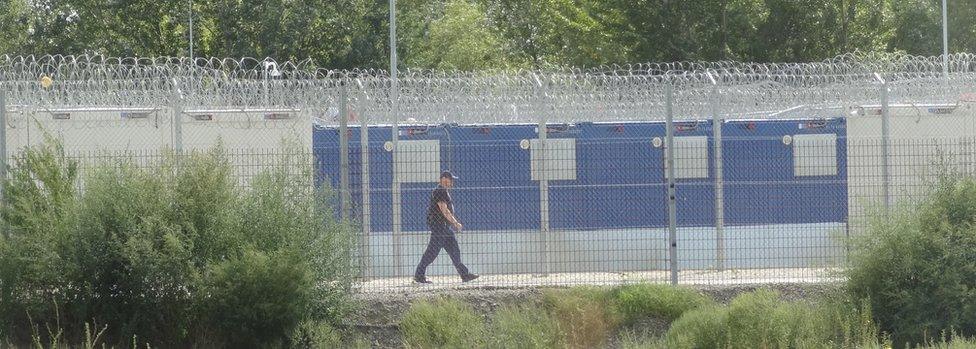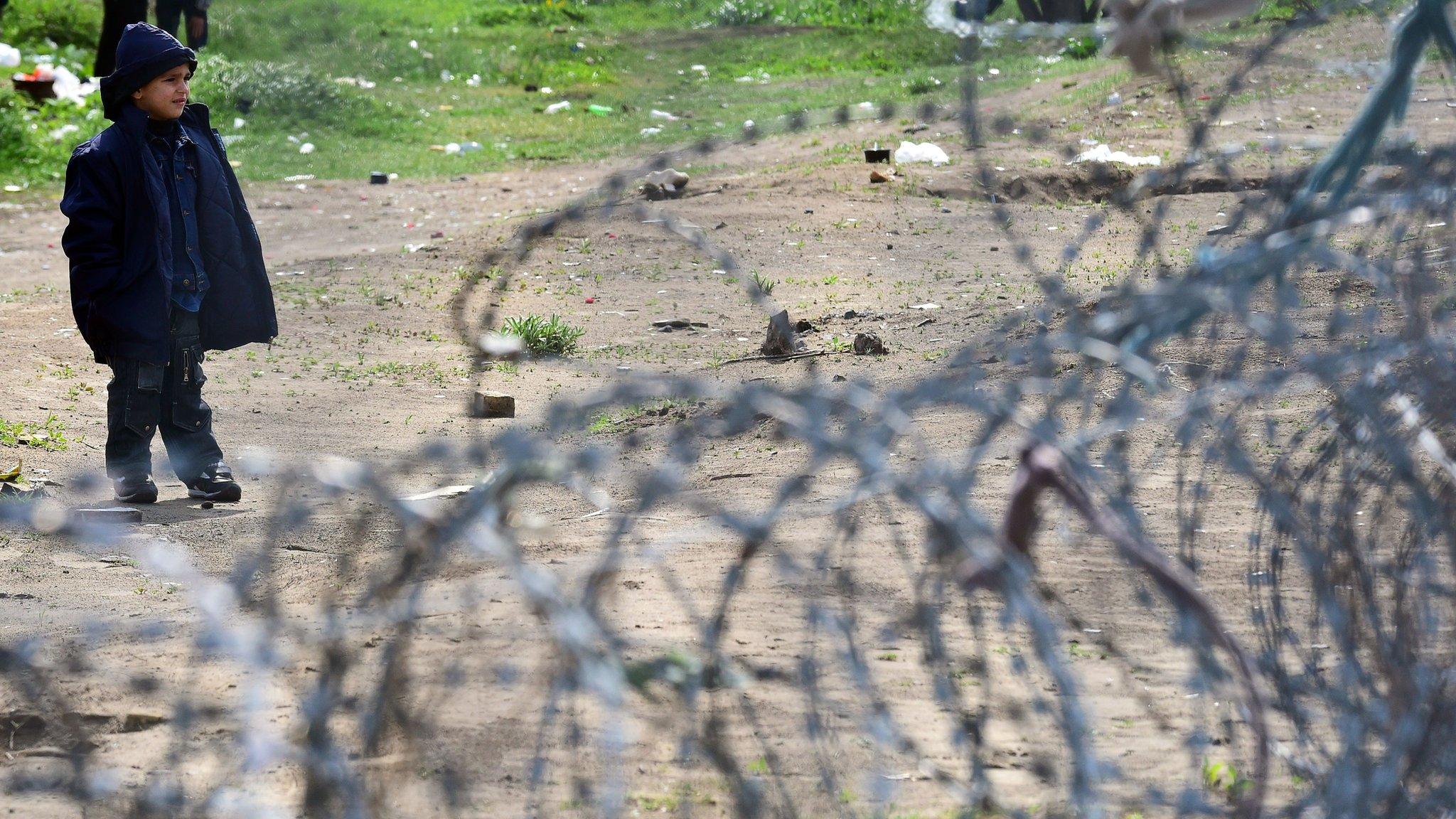Europe migrant crisis: Hungary rages at EU asylum verdict
- Published

Hungary is being told to take in asylum seekers waiting in Greece and Italy who have a strong case for refugee status
The Hungarian government's reaction to the European Court verdict was fast and furious. Foreign Minister Peter Szijjarto complained bitterly of politics being behind the "rape of European law and values".
The migration question is very emotive in Hungary, and has been skilfully used by the ruling Fidesz party to attract voters, ahead of next year's parliamentary election.
The opposition Socialist Party accused the Hungarian Prime Minister, Viktor Orban, of having "gambled and lost" by suing the European Commission.
Anticipating the verdict, the government has in the past days appealed to the European Commission to pay half the €880m (£800m; $1.05bn) costs of the Hungarian fence on its southern border.
Mr Szijjarto told reporters that this was his government's understanding of "solidarity".
The Commission rejected the request, on the grounds that it does not pay for border fences and had not contributed to the Bulgarian or Greek fences, though it had provided funds for surveillance equipment.

Hungary's Prime Minister Viktor Orban has one eye on elections next year
The ball is now in the European Commission's court, the Hungarian government believes.
'Illegal' migrants?
The foreign minister told reporters that the verdict did not compel Hungary to accept the 1,294 "illegal migrants" it was asked to take. The Commission will doubtless challenge that interpretation.
Hungary is now bracing itself for the Commission to turn to the European Court of Justice to ask it to punish those who refuse mandatory quotas.
In the longer term, the Hungarian government fears that EU members will impose a "permanent" requirement on member states to accept quotas. Wednesday's verdict only concerned the temporary emergency, from September 2015 to September 2017.
The court in its verdict, and the Commission in its statements, have underlined that the Hungarian government mislabelled those involved from the start.
The 160,000 asylum seekers referred to in the original decision, later reduced to 100,000, were deemed "highly likely" to receive asylum, meaning they had at least a 75% chance of getting asylum in the EU, based on the countries they came from - namely Syria, Iraq and Eritrea. Last year Germany accepted 91% of Syrian asylum seekers, while Hungary accepted only 9%.

At Roszke container camp, asylum seekers are divided into five sectors
Any EU country that accepts relocations from Italy and Greece also has the chance to screen them, and can reject them and deport them later if it finds security reasons to do so. The Hungarian government often cites the terror threat to justify its tough stance on migration.
Hungary's record of asylum
At the Transit Zone at Roszke, one of two container camps set up by the Hungarian government on its border with Serbia, some 300 asylum seekers sweltered in the late summer heat on Wednesday.
They are divided into five sectors within the heavily guarded, razor-wire rimmed camp. There is no shade, and no air-conditioning for inmates.
No-one can be seen from outside the perimeter fence, though the voices of children sometimes drift on the wind. As I watched, a ball flew up above the wire, then was gone.
According to the latest statistics of the Hungarian Immigration Office, 444 asylum seekers were granted protection so far this year - a 60% increase on the same period last year.
Human rights groups in Hungary explain the increase in terms of those allowed into the container camps in the first place - mainly women, children, and the most vulnerable.
Single men who have reached Serbia through the Balkans stand little chance of even having their asylum requests considered in Hungary, and can only reach Western Europe with the help of smugglers.
A note on terminology: The BBC uses the term migrant to refer to all people on the move who have yet to complete the legal process of claiming asylum. This group includes people fleeing war-torn countries such as Syria, who are likely to be granted refugee status, as well as people who are seeking jobs and better lives, who governments are likely to rule are economic migrants.
- Published6 September 2017
